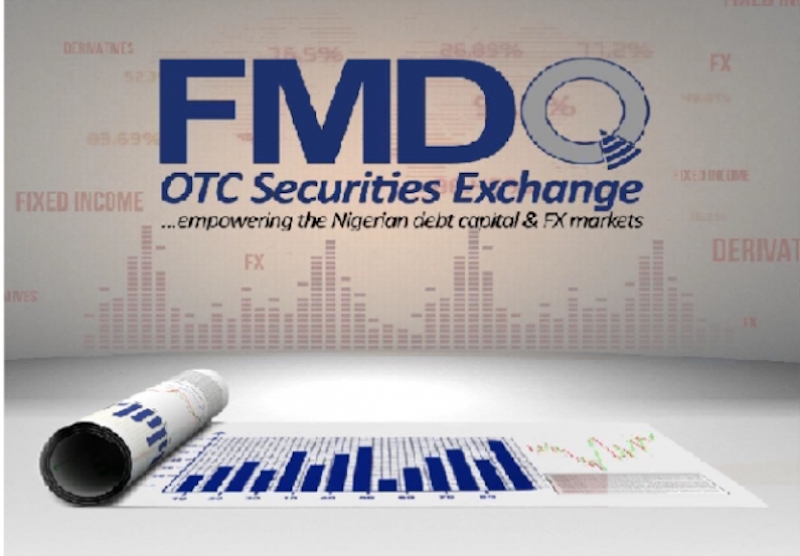Transaction turnover in Nigeria’s fixed income and currency markets expanded 32.98 percent in the month of June 2017 to ₦12.62 trillion, representing ₦3.13 trillion increase from the value recorded in May and a 34.65 percent (₦3.24trn) increase year-on-year, according to the latest FMDQ OTC monthly report seen by Businessamlive.
The report specifically indicates that the treasury bills (T-bills) segment of the fixed income market continued its dominance in the market in the month of June 2017 accounting for 43.22 percent (40.73% in May) while FGN2 bonds recorded 6.22 percent (5.23% in May) of total turnover in June.
Turnover in the fixed income market generally, in the month under review, settled at ₦6.24 trillion, representing a 43.03 percent (₦1.87trn) month-on-month increase. Transactions in the T-bills market accounted for 87.41% of the Fixed Income market, from 88.67 percent the previous month.
Outstanding T-bills at the end of the month stood at ₦8.51 trillion, a decrease of 3.98 percent month-on-month (₦8.87trn in May), whilst FGN bonds’ outstanding value increased by 1.44 percent (₦0.09trn) month-on-month to close at ₦7.03 trillion in the period under review.
The trading intensity in the fixed income market for the month under review settled at 0.62 and 0.11 for T-bills and FGN bonds respectively, from 0.43 and 0.07 recorded for the previous month. Maturities up to one month became the most actively traded, accounting for the turnover of ₦1.65 trillion in June.
On the other hand, activities in the secured money market (Repos/Buy-Backs) settled at ₦3.51 trillion in June, 34.28 percent (₦0.89trn) more than the value recorded in May. On a year-on-year basis, turnover on repos/buy-backs recorded a 26.34 percent (₦0.76trn) increase.
Unsecured placements/takings closed the month at a turnover of ₦0.13 trillion, a decline of 8.91 percent (₦0.01trn) month-on-month and 66.74 percent (₦0.26trn) year-on-year.
The dominance of the T-bills segment of the market is attributed to high yields and the relative risk in the investments.
See also: Services gulp nearly half of Nigeria forex disbursed in May, ahead industrial sector’s 26%
“In the world of debt securities, T-bills represent the greatest liquidity and the lowest risk to invested principal. They act as the closest thing to a risk-free return in the market,” an investment banker and trader told businessamlive.
He added that all other investments must offer a risk premium in the form of higher returns to entice money away from treasuries.
“In the current circumstance, the high yield and risk-free nature of treasury bills have lured many investors from the more risky deposit markets,” he said.
The CBN has been selling bills more than projected in recent months to curb borrowing costs as it aims to fund half of this year’s forecast budget deficit of N2.36 trillion through the domestic market.
In other words, government fiscal policies are also encouraging more investment in treasury bills at the detriment of the productive sectors, where the public sector is crowding out the private sector from the loans market.
The report equally indicated that activities at the foreign exchange (FX) market, accounted for 21.60 percent (24.88% in May) while money mark, et activities, including repurchase agreements [Repos]/buy-backs & unsecured placements and takings, accounted for 28.91 percent (29.13% in May) of total turnover for the reporting period.
Specifically, transactions in the FX market settled at $8.52 billion in June, an increase of 29.87 percent ($1.96bn) when compared with the value recorded in May ($6.65bn), which may be connected to the increased intervention in the market by the CBN.
The CBN actually sold a total of $1.476 billion through various interventions conducted during the period under review. It also maintained its marginal rate for the secondary market intervention sales (SMIS) – wholesale forwards intervention at ₦320/$ and ₦357/$ for small and medium-sized enterprises (SMEs) and Invisibles.
In the month under review, the CBN official spot rate experienced a slight depreciation, losing ₦0.45 to close at ₦305.90/$ from ₦305.45/$ at the beginning of the month. The naira strengthened in the parallel market by ₦6.00, closing the month under review at ₦366.00/$, further narrowing the gap with the Investors’ & Exporters’ (I&E) FX window which closed at ₦366.44/$.
Total volumes traded in the I&E FX window settled at $1.81 billion for June, an increase of 37.73 percent ($0.49bn) when compared with volumes recorded in May ($1.32bn). So far, the total volumes traded on the I&E FX window since its inception stand at $3.74 billion.
The 12th Naira-settled OTC FX Futures Contract NGUS JUN 21, 2017, with total open contracts worth $657.07mm, matured and settled within the reporting month, whilst a new 12-month contract – NGUS JUN 21, 2018 – for $1.00bn was introduced at $/₦374.67.
This also marked the first time the settlement amount was paid in favor of the contract seller (CBN), as the Nigerian Autonomous Foreign Exchange Fixing (NAFEX) on the settlement date cl







